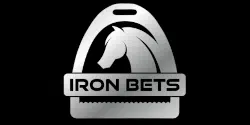US Horse Racing Betting
Horse racing betting has a long history in the United States and has received favorable treatment from lawmakers over the years as a result. In fact, online horse racing betting was legalized years before online casino games and sports betting were even under consideration. Today, in-person and online horse racing betting is legal in most states.
The National Thoroughbred Racing Association and American Horse Council have also played an important role in protecting the horse racing industry’s interests, including ensuring the passage of favorable legislation.
Greyhound racing betting has received similar treatment and is legal in most states where horse racing is permitted. However, greyhound racing has a major image problem right now related to how dogs are treated and only a few states even have active greyhound tracks today.
Legal Online Horse Racing Betting Sites

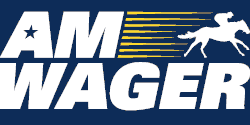
18/21+ to Play. T&Cs Apply. Gambling Problem? Call 1-800-GAMBLER
Online Horse Racing Betting
With most states permitting online horse racing betting, a competitive industry has developed around the sport. As long as you live in a racing-friendly state, you have at your fingertips numerous horse racing betting apps to choose from – each with its own unique advantages.
Best Horse Racing Betting Apps
Prominent brands like AmWager and TwinSpires have dominated the US online horse racing betting industry for years. However, they face increasing competition from major sportsbook brands like FanDuel and Caesars that have launched standalone horse racing betting apps.
Each of the following platforms is available as a horse racing app for both Android and iPhone. They all contain features such as free daily picks, detailed track information lists, live stream options, and more. However, each has its unique points, strong points, and weaknesses. We discuss all of that below.
Note: we only discuss legal, licensed betting sites here at USGambling.com. Any of the horse racing betting sites you see mentioned here or elsewhere on the website are truly legal in the United States with licenses from US authorities and headquarters on US soil.
1. AmWager App
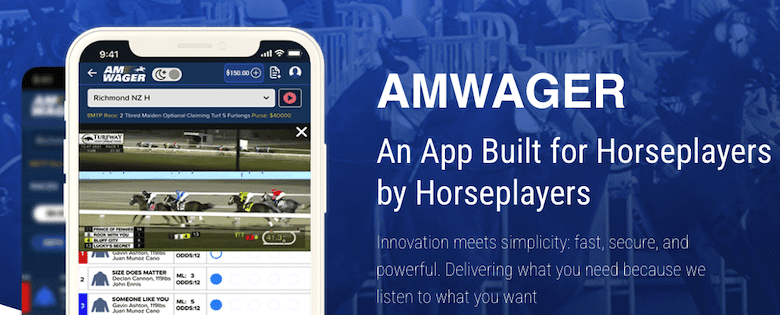
AmWager may not be as big a name as some of its competitors, but experienced bettors know AmWager is a legitimate, steady-hand racebook app. The AmWager app is reliable, predictable, and consistently rewards loyal players with its long-running rewards program. It just works.
AmWager is based in the United States and has been taking horse racing bets online since 2009. The AmWager app covers roughly 500 race tracks worldwide and offers bets on roughly a thousand racing events per day.
Additionally, AmWager provides the most extensive suite of horse racing betting and handicapping tools of any online racebook. Inexperienced bettors can stick with the basic interface for a straightforward wagering experience, but advanced bettors can delve deep into conditional wagering, dutch betting modifiers, rank betting rules, and more. Users can even use the AmWager Stable feature to follow specific trainers, owners, horses, and jockeys.
2. TwinSpires Horse Racing App
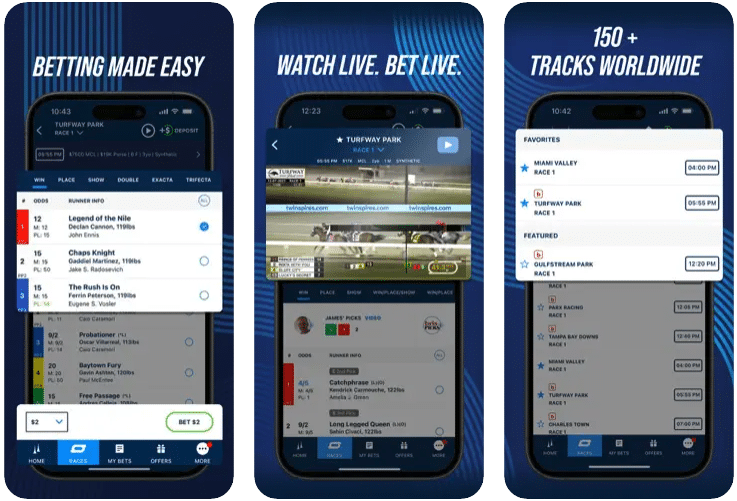
TwinSpires has legitimacy nailed down as the official wagering app of Churchill Downs and the Kentucky Derby. More importantly, the TwinSpires app covers horse races worldwide, welcomes new customers with a hefty bonus, and invites all users into Churchill Downs’ TSC Elite loyalty program.
Although the default TwinSpires wagering screen appears straightforward and intuitive, experienced bettors can activate more advanced wagering interfaces to toggle vast range of detailed stats and ranking figures. Unique features like “Bet Share,” which allows friends to build bets and split the cost equally, demonstrate that Churchill Downs Inc. considers TwinSpires to be a core product offering, not just an afterthought used to capitalize on its venerable brand.
Like other online racebooks, TwinSpires provides live racing video and race replays. The TwinSpires TV feature allows users to browse a massive replay library and filter by date, racetrack, and horse.
TwinSpires’ primary weak point is that it covers significantly fewer tracks than other prominent horse racing betting sites. However, TwinSpires covers all major US tracks and events, including the Kentucky Derby.
3. FanDuel Racing
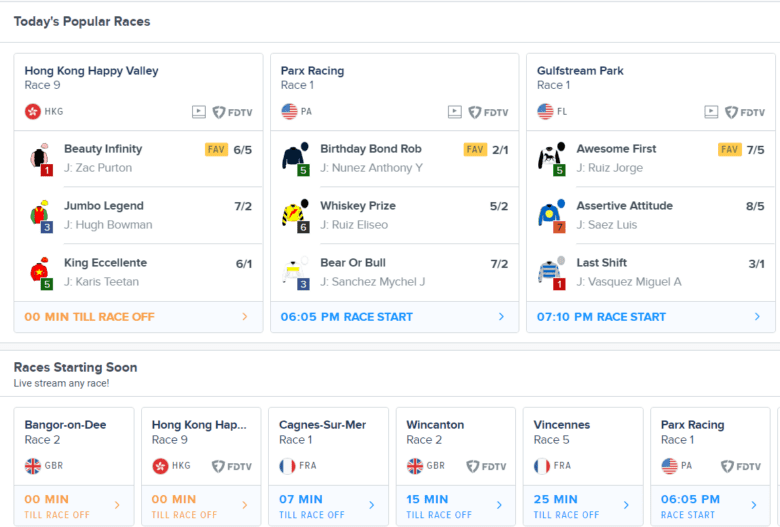
A titan in the US gambling market, FanDuel is behind one of the best sports betting and DFS platforms available in the country. Then it comes as no surprise that their standalone horse racing betting platform (FanDuel Racing) is one of the best horse racing betting sites in the US.
FanDuel Racing is available in most states and offers betting odds on the biggest horse racing events both in the US and abroad, including races like the Breeders’ Cup, Kentucky Derby, Dubai World Cup, and the Epsom Derby.
When it comes to bet types, both the single (Win, Place, Show) and so-called exotic wagers (trifecta, superfecta, etc) are supported over at the racebook. FanDuel Racing can be used both via the mobile app and desktop, both retaining the recognizable FanDuel interface. Overall, the FanDuel Racing app is pretty easy to use and contains helpful tutorials including those that help newbies understand horse racing odds.
While using FanDuel Racing you can quickly and easily access information about all the racetracks and upcoming races, as well as live-stream ongoing events and view the results from the racetrack.
4. Caesars Racebook
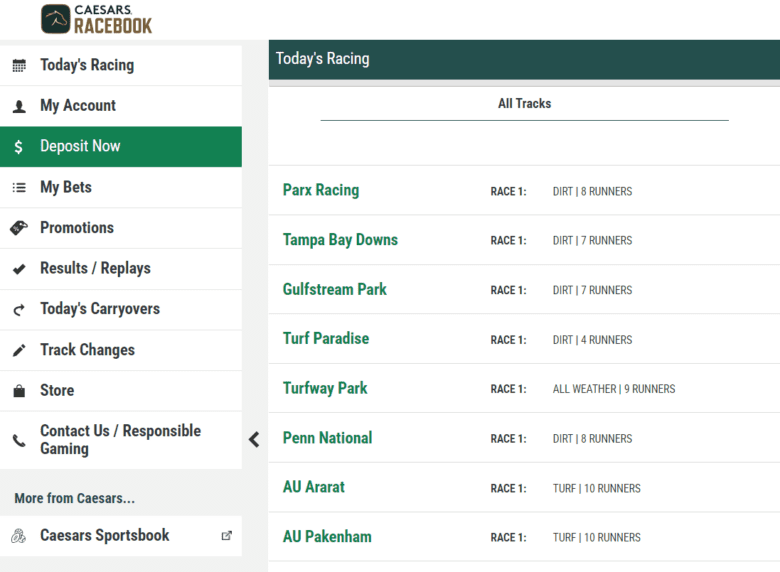
Caesars Racebook is the result of a partnership between Caesars Entertainment and longtime pari-mutuel wagering operator NYRA Bets. The Caesars Racebook app offers daily betting markets from over 300 racetracks worldwide to customers in 20+ states. Although we find the list of accepted states constraining, Caesars Sportsbook representatives have stated they plan to expand to 30+ states in the near future.
The Caesars Racebook app provides access to full standard and exotic wagering menus, live HD video streamed directly from each track, and race replays on demand.
Additionally, Caesars Racebook automatically links new users’ racebook accounts to their existing Caesars Rewards accounts. Anyone who doesn’t already have a Caesars Rewards account will automatically become a member upon registration. Once registered, customers will earn Reward Credits and Tier Credits for every wager they place.
5. BetMGM Horse Racing
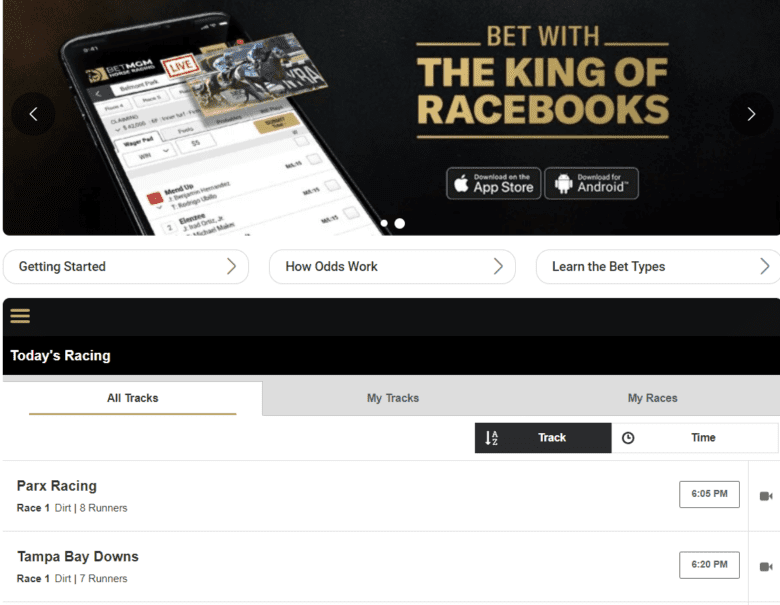
BetMGM Horse Racing is a full-featured horse race betting app operated by the well-known online gambling brand BetMGM.
BetMGM’s entrance into pari-mutuel wagering was made possible due to the company’s partnership with NYRA Bets and the New York Racing Association. This partnership allows BetMGM to offer wagers on over 200 thoroughbred, harness, and quarter horse racetracks worldwide.
During our review we found the BetMGM Horse Racing app overly basic, both visually and in terms of features. Sure, there are helpful guides to assist newcomers, but the app is somewhat rudimentary otherwise. However, the simplistic interface facilitates quick and frictionless wagering.
BetMGM’s horse racing app also features a live streaming tool like others entries on our list, allowing fans to keep up with their bets in real-time and watch the races unfold.
BetMGM Horse Racing’s biggest drawback is its extremely limited state availability. The app is currently only available in three states: Florida, Louisiana, and Ohio.
6. Bet365 Horse Racing
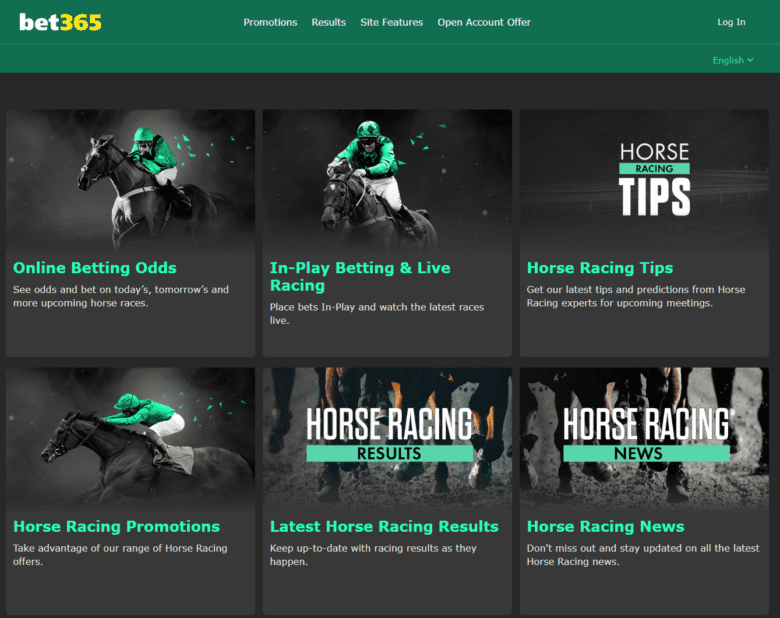
The Bet365 Horse Racing App offers an extensive selection of bet types, race tracks, live-streaming options, and handicapping tools to make it a well-rounded option for new and experienced bettors alike.
Bet365’s handicapping tools are particularly underrated because they extend beyond the simplistic handicapping statistical displays and tips articles that other racebooks offer. For example, customers can use the app’s “Top Stats” tool for projected win, place, and show probabilities for every horse in any upcoming race.
In addition to daily races held in the US and abroad, Be365 Horse Racing covers major events like the Kentucky Derby, Breeders’ Cup, Pegasus World Cup, and more.
Additionally, Bet365 Horse Racing launches new horse racing betting bonuses and promotions more frequently than all other US horse racing betting apps. Common promotional themes include enhanced odds offers, money-back specials, and bonus bets for existing customers.
The Bet365 Horse Racing app is available in 38 US states.
7. DK Horse
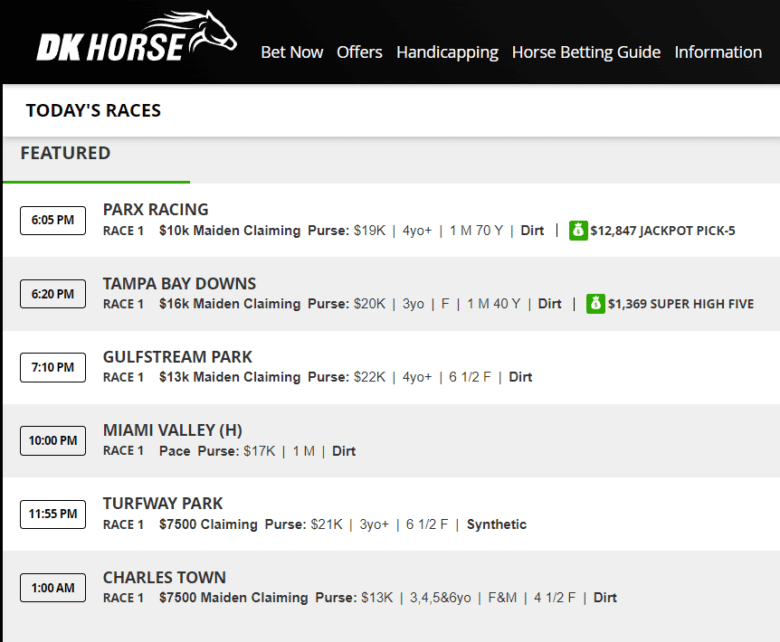
The DK Horse app is the result of a partnership between DraftKings and Churchill Downs, home of the Kentucky Derby.
DraftKings offers wagering on a vast selection of races big and small, including headliner events like Kentucky Derby, Preakness Stakes, and Belmont States. Further, the app is a pleasure to use thanks to the tried and tested interface that DraftKings has fine-tuned over the years.
The area where DK Horse falters is the extra features. While it does come with live streaming, the ability to inspect the pari-mutuel wagering pools and handicapping sections, the extra analytics many experienced bettors rely on are missing.
The DK Horse app is available in 20+ states.
8. TVG Horse Betting App

TVG is a licensed advance deposit wagering provider (ADW) and TV network (now called FanDuel TV) that has operated continuously since 1999.
Bettors can use the TVG app to bet on horse races nationwide, participate in wagering promotions, set alerts, and conduct research. The app also offers a detailed list of races and horses, which can then be filtered by time, track, featured, and favorites.
You can keep your eye on your bets at any time through the My Bets tab in the TVG app. Plus, you can watch your chosen races live. There are over 120 track feeds that you can choose from, including the option of watching a race on full screen. This means you can create your own version of a horse racing show on the move.
However, TVG is slowly merging into the FanDuel Racing ecosystem, so it’s unclear how long TVG will remain an independent app.
Note: TVG is available in Pennsylvania as PABets and in New Jersey as 4NJBets. TVG is also the official partner of the Breeder’s Cup
9. Xpressbet Racing App

The feature-rich Xpressbet app covers 300+ racetracks in the US and elsewhere
Users can choose from several wagering interface styles, each designed for increasingly advanced bettors.
In our experience, the basic Wagerpad Classic option is the best starting point because it’s simple but still allows users to place wagers of any type and includes an integrated video screen to watch the races live.
The other wagering screens facilitate advanced wagering and handicapping strategies at the cost of being far less intuitive.
A quality welcome bonus and ongoing benefits via 1/ST Rewards top off all of the above to make Xpressbet a well-rounded horse wagering app.
Horse Racing Betting Apps
Developing a quality mobile betting app is an expensive undertaking, so it is not exactly shocking that the three most successful horse racing sites also have the best mobile apps. If being able to bet on the go is important, any one of the horse betting apps mentioned on this page will serve you well.
Some of the smaller horse racing sites out there also offer mobile horse racing betting apps that will get the job done, but the big three are a clear step above in terms of functionality and performance. Things to look for when choosing a horse betting app include:
- Full track coverage: Any horse racing betting app worth your while must offer exactly the same variety of tracks covered by the full website. Ideally, this will include US and international race tracks as well as greyhound tracks.
- Live racing video: Live racing video always makes the experience feel more “real” in addition to just being more fun. Being able to watch races on the go is a standard feature with the best racing apps.
- Full betting selection: No betting app can be considered complete if it does not offer a full selection of wagers. This means you should be able to place standard win/place/show wagers as well as exotics (including being able to key and box your bets).
- Easy navigation: Limited screen real estate on mobile devices creates some very challenging issues for an activity as in-depth as horse racing betting. Presenting live racing video, wagering menus, track lists, account settings and more in a manner that isn’t completely cluttered is crucial to making any racing app usable.
States Where Online Horse Racing Betting Is Legal
Because horse racing is regulated at the state level, you’ll find that no two betting sites have an identical policy regarding the states in which they operate. Depending on where you live, you may be accepted by Caesars Racebook and TVG but not TwinSpires (or any other number of possible combinations). If you live in a state with legal horse racing betting but are unable to sign up for an account at one betting site, your best bet is to just try another major brand.
One or more licensed horse racing betting sites operate in the following states:
| Alabama | Arkansas | California | Colorado |
| Connecticut | Delaware | Florida | Idaho |
| Illinois | Indiana | Iowa | Kansas |
| Kentucky | Louisiana | Maine | Maryland |
| Massachusetts | Michigan | Minnesota | Montana |
| New Hampshire | New Jersey | New Mexico | New York |
| North Dakota | Ohio | Oklahoma | Oregon |
| Pennsylvania | Rhode Island | South Dakota | Tennessee |
| Vermont | Virginia | Washington | West Virginia |
| Wisconsin | Wyoming |
How Internet Wagering Benefits the Horse Racing Industry
Legal horse racing betting has played no small role in maintaining horse racing as a viable industry in the United States. Without the legalization of off-track betting, followed by the legalization of online wagering, the horse racing industry would likely look very different today.
The key to all of this is the manner in which horse racing betting sites are regulated in the US. Every licensed horse betting site is required by law to obtain the permission of every track upon which it accepts wagers. For example, BetAmerica must obtain prior approval from Dover Downs before taking wagers on any race hosted there.
Additionally, all wagers placed online through licensed horse betting sites are pooled with wagers taken at the host track. This builds local purses and supports the industry while at the same time guaranteeing customers betting online are paid at exactly the same odds as if they had placed the wager in person at that track.
The importance of off-track and online betting to the industry explains why horse racing has managed to receive exemptions from numerous federal laws enacted over the years to crack down on every other form of wagering. Even as the federal government became increasingly hostile to sports betting and online gambling from the 1960s onwards, legal forms of horse racing betting actually expanded.
Online betting now accounts for a significant chunk of total handle. For instance, the 2018 Kentucky Derby generated a total of $149.9 million in wagers from all sources. Of that amount, TwinSpires.com accounted for $24.6 million, or more than 16% of the race’s total handle – and that’s just for one of the many racing sites that are licensed across the US.
As a result of the legalization of online horse racing betting, total handle has grown significantly over the years. Advances in technology further fueled the growth and resulted in an increase of nearly 46% in annual horse betting handle from $10.4 billion in 1995 to $15.2 billion in 2003. This growth occurred even as the number of races declined by 14% from about 62,000 per year to about 54,000 per year over that same period.
The IHA has certainly served the racing industry well, but some in recent years are again calling for Congress to revisit the Act now that online betting is so widespread. Thoroughbred Racing Commentary (TRC) noted back in 2015 that tracks now actually make more money when people bet through track-owned wagering accounts than they make from bets placed in-person.
As a consequence of contracts between tracks and advance deposit wagering (ADW) companies, less money is being added to purses via betting. Tracks make up for this shortfall by diverting money away from other on-track offerings such as slots, but TRC argues a new update to the IHA is necessary because these other sources of purse funding are not guaranteed in the future and the industry cannot rely on them to prop it up.
How Parimutuel Wagering Works
If you haven’t heard of parimutuel betting before, that’s to be expected. Horse and greyhound betting are the only two mainstream forms of legal gambling in the United States conducted in the parimutuel format.
Parimutuel betting works by putting all wagers for a specific type of bet into a single pool. The house then takes its cut out of the pool (this is the “takeout” or “take”) and splits the rest among all winning wagers. In this way, the odds are determined entirely by how much money is bet on each horse rather than by an oddsmaker like you would see at a fixed-odds sportsbook.
By pooling the wagers in this manner, longshots and favorites are properly priced in a manner that makes sense. Consider this: a horse that is widely perceived by the betting public to be the favorite will naturally attract a lot of wagers. If that horse goes on to win, the betting pool must be split among all the people who bet on that horse – thereby pushing down the payout odds for each individual winner.
Likewise, a longshot horse in a race tends to attract fewer wagers due to the public not being as confident in that horse’s ability to actually win the race. If that horse does end up winning, there are fewer winning tickets amongst which the pool must be split – giving each winning ticketholder a larger slice of the pie.
Parimutuel Betting Example
The actual calculations that go on behind the scene can be quite complex with many different wagers coming in on any given race, but this simplified example illustrates the idea in simple terms.
Imagine a five-horse race in which each horse receives the following amounts of action on a basic bet to win the race:
- Horse A: $500
- Horse B: $400
- Horse C: $300
- Horse D: $200
- Horse E: $100
The amount of wagers outstanding in this example totals $1500.
For the purposes of this example, let’s say this particular racetrack enforces a 10% takeout.
That leaves $1,350 in the pool after the takeout.
Now, imagine Horse A wins the race. That means every person who bet on Horse A will get a piece of the $1,350 in the pool. We know how much money was bet on that horse and we know the total pool, so we can calculate exactly how much money will be returned for every $1.00 wagered on that horse.
All we have to do is divide $1,350 by $500 and we get $2.70. That’s how much money will be returned for every dollar wagered on that horse. Thus, a $1 bet on Horse A would return $2.70 while a $10 bet on that horse would return $27.00.
Now, let’s see what happens if Horse E wins the race. From what we’ve discussed so far, we can expect Horse E to offer a higher payout because much less money was backed on that horse.
This time, we divide $1,350 by $100 to get $13.50. If you wagered $1 on Horse E in this example, you would have won $13.50. If you wagered $10 on Horse E, you’d be looking at a payout of $135.
Again, this is just a simplified example, but it shows how the numbers work out in such a way that favorites end up offering smaller payouts while longshots end up offering bigger payouts. It all comes down to how many ways the prize pool must be split after a winner is decided.
Morning Line Odds Explained
Although the final odds are never known until just before each race goes off, race tracks do employ oddsmakers to set the morning line odds. The most important thing to know about morning line odds is they are not firm nor are they guarantees. The morning line odds are just estimates from the oddsmaker designed to give bettors a general idea of what to expect.
As Arlington Park oddsmaker Joe Kristufek once put it, his job “is to predict, as accurately as possible, how the betting public will wager on each race. The actual odds change minute by minute based on how much money is bet on each horse.”
This bring us to our next point, which is important to note. The changing nature of the odds is perhaps the greatest disadvantage to parimutuel betting. Even after you place a bet, the payout odds could change (possibly drastically) by the time the race goes off despite what the odds board said at the time you placed that wager.
Parimutuel betting odds are inherently uncertain because they are based entirely on the amount of money that comes in on each horse. This is why one of the keys to successful handicapping is to not only evaluate horses, but also to consider how the betting public is likely to influence the odds.
Types of Horse Racing Bets
Horse racing wagers can be broadly categorized into two major groups. First are the basic straight bets which involve picking a single horse in a single race. Straight bets are the simplest of all horse racing wagers and are the ideal starting point for new handicappers. Moving beyond those are the exotic bets involving multiple horses.
Straight Bets
- Win: This iconic wager is the simplest bet of all and is probably the first one that comes to mind when most people think of horse racing. The win bet is a simple wager on a single horse to win the race. If your horse takes first place, you get paid. If your horse finishes in any other position, your bet is lost.
- Place: Place bets work similarly to win bets except you get paid if your horse finishes in first or second place. Payouts are a little smaller in return for this wager being easier to win. Whether your horse finishes in first or second makes no matter; the payout is the same for either position.
- Show: A show bet pays if your horse finishes anywhere in the top three positions. Payouts are less, but this is the easiest of the straight bets to win because all your horse needs to do is finish in first, second or third place.
- Win/Place: This is a combination bet involving a win wager and a separate place wager on a single horse. If your horse finishes in first, you are paid for both wagers. If your horse finishes in second place, you lose the win portion of your bet but win the place portion.
- Win/Show: Similar to a win/place bet except this one involves a win wager and a show wager on a single horse. If your horse finishes in first place, you are paid for both wagers. If your horse finishes in third place, you are paid for the show portion only.
- Across the Board: This is another combination wager involving a win bet, place bet and show bet on a single horse. If your horse finishes first, you win all three bets. If your horse finishes second, you win the place and show bets only. If your horse finishes third, you win the show bet only.
Exotic Bets
- Quinella: A quinella bet involves picking two horses to finish in first and second place. Their order of finish does not matter as long as your two picks finish in the top two spots.
- Exacta: An exacta bet takes a quinella bet one step farther by requiring you to pick the two horses who will finish in first and second place in that exact order. This one is more difficult to win than a quinella but can offer some very hefty payouts. This wager is also sometimes called a perfect.
- Exacta Box: An exacta has you predict the first and second place horses in that exact order, but you can box your bet to cover every combination and can even add additional horses to the mix.
- Trifecta: Moving up one more level in both difficulty and payout potential, the trifecta involves picking three horses to finish in first, second and third place in that exact order.
- Superfecta: Superfectas ramp it up one more time by having you pick the first four horses to finish in first, second, third and fourth place in that exact order. These wagers are difficult to win for obvious reasons, but payouts start to get into lottery territory even with a small wager. For instance, seven $1 superfectas placed at the 2005 Kentucky Derby paid a whopping $846,253.50 after 50-1 longshot Giacomo defied the odds and won the race.
- Daily Double: In the daily double, you attempt to pick the winning horses of two consecutive races. Typically, tracks offer daily doubles for back-to-back races running all day long. The minimum bet varies from track to track, but generally you can take daily doubles for as low as $0.50 to $2.00.
- Pick 3: This one is just like a daily double, except you’re attempting to predict the winners of three consecutive races.
- Pick 4: Pick the winners of four consecutive races and you’ll be looking a nice payout if you win.
- Pick 5: As you can probably guess, a Pick 5 wager involves picking the winning horses of five consecutive races.
- Pick 6: Pick 6 wagers offer some of the biggest horse racing betting payouts, with even the occasional millionaire being minted after nailing a Pick 6. Pick 6 wagers often result in a carryover, which means the prize money rolls over to the next day’s races if no one wins the Pick 6 one day. In 2008, a winning Pick 6 at Churchill Downs earned one fan $1,127,774.60.
- Quinella: A quinella bet involves picking two horses to finish in first and second place. Their order of finish does not matter as long as your two picks finish in the top two spots.
- Super Hi-5: The Super High Five (or pentafecta depending on who you ask) is a progressive jackpot wager offered by tracks for select races. In a Super Hi-5, you are attempting to predict the top five finishers in a race in that exact order. If no one wins a Super Hi-5 on that day, the pool carries over to the next day and the next day after that until someone wins the whole thing. As you can imagine, payouts for this wager can grow to substantial heights.
For example, an exacta box on Horse 1 and Horse 2 would essentially be the same as placing two different exacts covering both possibilities. In this way, your exacta box wins regardless of the order of finish. As long as horses A and B finish in first and second in any order, your exacta wins. This is not the same as a quinella because you’ll still be paid according to exacta odds (although the cost of your bet does increase).
If you wanted to place an exacta box on Horses 1 and 2 in-person at the track, you might ask the teller for a $2 exacta, horses 1 and 2. This wager would cost you $4 because it covers every possible combination (i.e. two possible combinations).
An exacta box can even include more than two horses to further increase your odds of winning at the cost of your ticket price going up. For instance, a $2 exacta box covering three horses will cost you $12 as there are now six possible combinations by which any three of those horses can finish in first and second place.
Costs for a $2 Exacta Box
| Number of Horses | Your Cost |
| 2 | $4 |
| 3 | $12 |
| 4 | $24 |
| 5 | $40 |
| 6 | $60 |
- Trifecta Box: Similar to an exacta box, a trifecta box covers every possible combination. In this case, your wager wins as long as your selections finish in the top three positions in any order. There are more possible combinations in a trifecta, so the price of this bet can go up quickly as you add more selections. Because of this, it is not uncommon for people to place $1 trifectas in order to keep the cost reasonable.
Costs for a $1 Trifecta Box
| Number of Horses | Your Cost |
| 3 | $6 |
| 4 | $24 |
| 5 | $60 |
| 6 | $120 |
- Superfecta Box: Like the exacta and trifecta boxes, superfecta boxes cover every possible finishing order for four or more horses. These get even pricier, but payouts for a winning superfecta can be massive under the right circumstances.
Costs for a $1 Superfecta Box
| Number of Horses | Your Cost |
| 4 | $24 |
| 5 | $120 |
| 6 | $360 |
| 7 | $840 |
- Exacta Keys and Wheels: Keying an exacta focuses on one “key” horse to finish first while allowing you to add other selections to finish in second place. An exacta key wins when your key horse takes first and any of your other selections finishes second. This bet comes in handy when you’re confident in one particular runner taking first but aren’t as sure about who may take second.
There are a few ways to go about constructing an exacta key. For instance, you can select Horse 1 as your key horse over Horse 2, Horse 3 and Horse 4 if you are confident in Horse 1 but not as sure about the others. This wager would win as long as Horse 1 finishes first and any of your other selections take second.
Another way to construct an exacta key is to pick two or more key horses and add selections under them. For instance, you could key Horse 1 and Horse 2 over Horses 1, 2, 3 and 4 to cover a variety of combinations as long as Horse 1 or Horse 2 wins the race and any one of the other selections finishes second.
The two above examples can also be considered “partial wheels.”
That name is in reference to a “full wheel,” which is an exacta that keys one or more horses and covers every other possible horse to finish in second place. For example, a full wheel in a seven horse could key Horse 1 above all the others. This wager would win no matter what happens as long as your key horse finishes first.
- Trifecta Keys and Wheels: Trifecta keys and wheels function just like their exacta counterparts. You pick one or more key horses as your first place finisher and then add any number of additional selections to finish in second and third place in any order.
The time to use a trifecta key or wheel is when you have a certain horse in mind for first place, but aren’t as confident in the other finishers. In this case, you might pick Horse #4 to finish in first place and then add Horse #2, Horse #3 and Horse #5 to take second and third place in any order behind Horse #4.
Likewise, a full trifecta wheel would involve picking one or more key horses and then adding every other horse in the race to finish in second and third place. As long as your key selection(s) win, you’ll win this wager no matter who finishes in second and third.
A $1 trifecta wheel in a 7-horse race with Horse #2 as your key horse would cover every possible combination of outcomes as long as Horse #2 takes first. This wager would cost $30 as it would cover 30 possible combinations
Major US Horse Racing Events
While it is true modern horse racing attendance numbers have slipped compared to the glory days of years past, you won’t be suffering a lack of events to bet on any time soon with more than 35,000 races held in the US alone every year.
And if that somehow isn’t enough to satisfy the hardest of hardcore racing fans, betting sites licensed in the US are permitted to take wagers on races held in all corners of the world. Major horse racing betting sites cover tracks from a diverse range of countries.
BetAmerica.com, for example, covers a little over 300 tracks from around the world. The other major horse racing sites offer similar coverage of domestic and international events.
Naturally, the major horse racing events here in the US are covered by all the major names in online betting as well. There are way too many events for us to discuss them all in one page, but some of the bigger domestic events you can bet on include the following.
The Triple Crown of Horse Racing
The Triple Crown of horse racing is by far the biggest betting event in all of US horse racing both in terms of betting handle and track attendance. Every year, the three Triple Crown races attract in excess of 300,000 people and generate hundreds of millions of dollars in betting handle in aggregate.
Each of the three Triple Crown races is a spectacle of its own with traditional drinks, fancy hats, well-dressed attendees and of course the sheer size of the event.
On top of that, the Triple Crown title is a notoriously difficult achievement with only a handful of horses going on to win three long and extremely competitive races in a row over a five-week span. To further complicate matters, every horse has just one chance to win the Triple Crown title as these races are only open to three-year-old horses.
It is only natural that people want to be on-hand if there’s a chance history will be made. The Kentucky Derby kicks off the Triple Crown season every year with a fresh start for all, often with beautiful weather and no shortage of beautiful people in attendance.
The running of the Kentucky Derby then gives the world its first look at the next Triple Crown contender. Whoever wins the Derby will be watched closely, and thus build anticipation for the Preakness Stakes.
If the Kentucky Derby winner goes on to win the Preakness Stakes, excitement for the Belmont Stakes builds even more than usual with spectators tuned in for a chance to watch history in the making. Even if there isn’t a contender when the Belmont Stakes rolls around, it remains a major event all on its own with some of the best horse racing you’ll find in the United States.
Kentucky Derby Betting
- Official website
- When: 1st Saturday every May
- Distance: 1 ¼ miles
- Track: Churchill Downs in Louisville, Kentucky
The Kentucky Derby is held every year on the first Saturday in May at the venerable Churchill Downs racetrack. This is the biggest horse race in North America and the entire 14-race program generates upwards of $200 million in betting handle between wagers placed trackside, via OTB locations, and through ADW websites such as BetAmerica, TVG and TwinSpires.
Churchill Downs Inc operates the Kentucky Derby and owns the track upon which it is run in addition to managing tracks, casinos and betting sites across the country. Both BetAmerica.com and TwinSpires.com are owned by Churchill Downs Inc. Additionally, the company operates sportsbooks in states with legal sports betting.
Preakness Stakes Betting
- Official website
- When: 3rd Saturday every May
- Distance: 9.5 furlongs (1 3/16 miles)
- Track: Pimlico Race Course in Baltimore, Maryland
The Preakness Stakes runs on the third Saturday of every May, two weeks after the Kentucky Derby. In recent years, total betting handle for the 14-race program has come to exceed $90 million a year to make this another one of the year’s biggest horse races.
With hardly any time for the Kentucky Derby runners to load up and ship out to Baltimore, many trainers opt to rest their horses by sitting out the Kentucky Derby and hitting the Preakness Stakes fresh or by running the Derby and skipping the Preakness. This too adds to the difficulty in achieving a Triple Crown title as the winner of the Derby will be facing fresh horses in each of the next two races.
Belmont Stakes Betting
- Official website
- When: 3 weeks after Preakness, generally 1st Saturday every June
- Distance: 1 ½ miles
- Track: Belmont Park in Elmont, New York
By the time the Belmont Stakes rolls around every year, we have usually had a good look at some of the runners and may even have a Triple Crown contender up to bat. This is the longest race of the three and will be the longest race in many horses’ entire career.
The Belmont Stakes is brutally long and comes at the end of a grueling stretch, so many trainers opt to enter fresh horses in this one – which again makes a Triple Crown title all the more impressive.
Betting handle for the Belmont Stakes is always a big number, but still varies by quite a bit depending on the presence (or lack thereof) of a Triple Crown contender. In recent years, total handle on the Belmont Stakes has approached $140 million across all the day’s races and upwards of $90 million on the Belmont Stakes alone when a Triple Crown contender has been present.
Breeders Cup Betting
- Official website
- When: First week of November
- Track: Varies
The annual Breeders’ Cup meeting ranks right up there with each of the Triple Crown events in terms of prestige, prize money and wagering handle. With two days of top-flight racing and no single race worth less than $1 million, the Breeders’ Cup is always guaranteed to feature some of the best horses in the world.
The Breeders’ Cup capstones the horse racing season every year over two days during the first week of November. Attendance numbers vary due to the event being held at a different track every year, but wagering handle easily tops $150 million year in and year out.
Other Popular Horse Races
Dubai World Cup
- When: Last Saturday every March
- Distance: 2,000 meters (or about 10 furlongs)
- Track: Meydan Racecourse, Dubai
The annual Dubai World Cup is the richest single day in horse racing with $35 million in purse money spread across nine races. Six Group 1 races and three Group 2 races comprise the Dubai World Cup with the main event carrying a purse of $12 million.
This event attracts many of the best horses in the world as one would expect considering the prize money up for grabs. Some of the noteworthy horses to have won Dubai World Cup in years past include Arrogate (2017), California Chrome (2016), Animal Kingdom (2013) and Curlin (2008).
Despite taking place overseas, the Dubai World Cup remains accessible to handicappers right here in the US through the major licensed betting sites. If you’re keen to bet on the next World Cup, all you need is an account at one of the major horse racing sites headquartered in the United States.
Pegasus World Cup
- Official website
- When: Late January
- Distance: 1 1/8 miles
- Track: Gulfstream Park at Hallandale Beach, Florida
The Pegasus World Cup is the newest super-race to join the racing calendar, having held its first running in 2017. Every January, the Pegasus World Cup holds one race on turf and one on dirt with $17 million in prize money between the two of them.
Both races are open to four-year-olds and above with the last iteration charging a hefty entry fee of $500,000. Even that is down from the original $1 million, back when the Pegasus World Cup was a singular dirt race and before adding the turf race in 2019.
In 2019, the Pegasus World Cup introduced a new type of wager called the Pick-24. If any fan is able to pick the exact finishing order of both 12-horse races, he or she will also earn a $5 million bonus.
Types of Horse Races in the US
In the United States, horse racing encompasses various types of races, each with its own characteristics and significance.
Thoroughbred Racing: Thoroughbred racing is the most prominent type of horse racing in the U.S. The main categories of thoroughbred races include:
- Claiming Races: Horses are available for purchase before the race, and anyone can claim a horse by submitting a claim slip before the race starts.
- Allowance Races: Horses in allowance races are not for sale, and these races are a stepping stone for promising horses before moving up graded stakes races. Many allowance races have conditions, such as only being open to horses
- Stakes Races: Stakes races are high-profile events with larger purses. They include Grade 1, Grade 2, and Grade 3 races, which are ranked by prestige and purse size. Examples include the Kentucky Derby, Belmont Stakes, and Breeders’ Cup races.
- Handicap Races: Horses carry different weights based on their past performance to level the playing field and create a more competitive race.
Quarter Horse Racing: Quarter horse racing is known for its high-speed sprints over short distances (generally a quarter of a mile). It is particularly popular in the southwestern U.S.
Harness Racing: Harness racing involves standardbred horses pulling drivers in two-wheeled carts (or sulkies).
Steeplechase Racing: Steeplechase races involve horses jumping over obstacles like fences and hurdles. Notable steeplechase events include the Grand National at the Far Hills Race Meeting.
Arabian Racing: Arabian horse racing features purebred Arabian horses competing in flat races, often over short to middle distances.
Mixed Discipline Races: Some tracks host mixed discipline races that combine elements of different types of racing, such as a turf race followed by a jump race.
Match Races: Although less common today, match races involve just two horses competing against each other, often to determine supremacy or settle disputes.
Derby Races: Similar to the Kentucky Derby, many states have their own derby races for three-year-old horses.
State-Bred Races: Many states offer races exclusively for horses bred within that state, promoting local breeding industries.
Claiming Crown: A series of races that focuses on claiming horses, often held as a season-ending event.
US Horse Racing Betting Laws
In-person and online horse racing betting are governed by a myriad of federal and state laws. At the federal level, horse racing betting in all its forms is regulated by the Interstate Horseracing act of 1978 (IHA).
The act itself is a bit of a technical and dry read, but the gist of it is that interstate horse racing betting is legal as long as the activity is legal in both states. An amendment to the IHA approved in 2000 further extended the act’s reach by authorizing online wagering.
The IHA amendment cleared the way at the federal level, but individual states also have the authority to regulate or prohibit online horse racing betting as they see fit. This is why online betting is legal in some states but not others. Additionally, the process for betting sites to be approved varies from state to state, which explains why not all racing sites accept players from the exact same list of states.
In summary, in-person and online horse racing betting are legal in most US states. You can scroll back up almost to the top of this page to see a complete list of states where online horse racing is permitted.
Horse racing existed in the United States before it was even called the United States, but only rose to prominence in the late 19th century with the introduction of parimutuel wagering, resulting in the sport enjoying a period of immense success from that point on up through the 1960s.
In 1970, New York made the controversial decision to legalize off-track betting parlors (OTBs) in a gambit to raise more money for local governments in the state. The legalization of OTBs shook up the industry because for the first time, they made it possible to place wagers on horse races without actually being at the host track.
The racing industry lambasted the move as it cut into on-track attendance and takeout because people across the state no longer had to visit tracks in-person to bet on races. To add insult to injury, wagers placed via OTBs contributed significantly less to the local racing industry than those placed in-person.
Under New York’s law, only 1.5% of OTB betting handle went to the horse racing industry. This was in contrast to about 7% of on-track betting handle going to the industry. A study conducted in 1974 concluded that OTB betting in New York resulted in a decline of $201 million in handle at race tracks and a decline in attendance of 2.6 million people over 1971 and 1972 alone.
Continued squabbling between New York’s betting parlors, racetrack operators and lawmakers eventually resulted in Congress stepping in with the Interstate Horseracing Act. Under the IHA, off-track betting was formally legalized, but only for OTBs that received approval from individual race tracks before taking wagers on races held at those tracks.
The IHA served as a compromise between the various stakeholders involved in racing and resulted in growing purses for tracks across the country. With tracks now getting an acceptable piece of the action via off-track wagers, OTB parlors making money off races held across the country and patrons no longer limited by geography, total betting handle grew rapidly.
Congress amended the IHA in 2000 to allow it to apply to online racing betting. With the 2000 IHA amendment, online racing betting was legalized in the United States and has remained so ever since.
HR 4942 was the bill passed to amend the IHA and did so by expanding the definition of a legal “interstate off-track wager” to include the following phrase:
“…and includes pari-mutuel wagers, where lawful in each State involved, placed or transmitted by an individual in one State via telephone or other electronic media and accepted by an off-track betting system in the same or another State, as well as the combination of any pari-mutuel wagering pools.” [emphasis added]
The National Thoroughbred Racing Association (NTRA) and American House Council (AHC) were both instrumental in convincing Congress to approve an amendment to the Interstate Horseracing Act for the good of horse racing as an industry. At the time, the racing industry was in a serious state of decline and racing advocates sold online wagering as an important tool to ensure the viability of the industry.
The IHA is the only federal law directly dealing with horse racing, but the sport is mentioned in in one other federal law: the Unlawful Internet Gambling Enforcement Act of 2006.
In 2006, Congress passed the Unlawful Internet Gambling Enforcement Act (UIGEA) in an effort to combat the proliferation of unauthorized gambling sites operating from overseas and outside the reach of local authorities here in the United States.
Rather than targeting the patrons of unlicensed gambling sites, the UIGEA was crafted to target the money supply. Under the UIGEA, financial firms are prohibited from processing payments on behalf of unauthorized gambling sites. The end result was players suddenly found it much more difficult to fund their offshore gaming accounts or get paid.
Additionally, the UIGEA clarified the official US stance on offshore gambling for operators who insisted the law was unclear: the US does indeed consider unlicensed gambling websites to be illegal and will target them with enforcement action.
The passage of the UIGEA had a dramatic and immediate impact on the industry. Shortly after the UIGEA took effect, many of the biggest US online gambling sites exited the US market altogether.
However, online racing betting was granted an exemption. A key piece of text (page 72) in the UIGEA states the term “unlawful Internet gambling” does not include wagers authorized by the Interstate Horseracing Act of 1978.
US Greyhound Racing
Greyhound racing betting is governed at the state level exclusively in the United States. The one attempt to regulate greyhound racing at the federal level was the introduction of the Interstate Greyhound Racing Act of 1990 (IGRA). The IGRA was modeled after the Interstate Horseracing Act of 1978 and would have set in place federal guidelines for interstate greyhound betting but died before becoming law.
Public perception towards greyhound racing is negative for the most part and at least 40 states have passed laws prohibiting the activity. Today, only a handful of states have active greyhound tracks and even those face an existential threat due to negative public perception, declining attendance and falling revenue.
Florida remains the biggest greyhound racing state today, but even there the sport’s demise is certain. During the 2018 midterm elections, Florida voters chose to shutter the industry entirely by approving a ballot measure banning greyhound races and betting on races held in the state. Floridians may still bet on races held in other states, but all local racing action will phase out on 1 January 2021.
The loss of greyhound racing in Florida will serve a devastating blow to the industry as a whole. At the time the Florida greyhound racing prohibition was approved, the state was home to 11 of the country’s 17 total greyhound tracks. After the prohibition takes effect, that will leave just three states with active greyhound tracks:
- Arkansas (last greyhound track scheduled to close by the end of 2022)
- Iowa
- West Virginia
Florida was the first state to legalize greyhound racing back in 1931 and reigned as the epicenter of the sport for decades. In years past, greyhound racing was a legitimate draw that attracted crowds of people who would fill the stands, make it a night of watching the races and bet large sums of money in aggregate.
However, as other gaming and entertainment options expanded to compete for visitors’ time and money, greyhound racing entered a long decline as a spectator sport. Anti-greyhound advocacy group Grey2K USA noted that between 2001 and 2014, total betting handle on greyhound racing across the nation declined by 70%.
Florida remained a greyhound stronghold despite those grim numbers due to a quirk in state law which until recently only allowed card rooms to operate if they were hosted at locations offering parimutuel wagering on horse racing, greyhound racing or jai alai. Additionally, tracks in Miami-Dade and Broward counties were able to host slot machines.
Even as greyhound racing revenue dwindled to almost nothing, greyhound tracks continued operating in Florida merely as a means to an end – to remain eligible to offer those other forms of gaming which provide significantly more revenue to operators. That too is set to change as the amendment passed in 2018 to ban greyhound racing in Florida included a measure that will allow those facilities to continue offering other forms of gaming without running greyhound races.
With Florida set to end greyhound racing, tracks in other states face great uncertainty and seem unlikely to survive too much longer. Grey2K USA reported back in 2014 that 75% of wagers booked on greyhound races took place via simulcasting or advance-deposit wagering websites. Thus, the loss of more than half the nation’s race tracks will put a serious dent in total betting activity across the country.
Absent a major and unlikely change in the industry, greyhound racing is likely entering its final chapter in the United States. Fans of the sport can still bet on greyhound races online today, but that option too is on borrowed time if current trends continue unabated.


